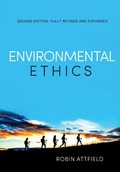Environmental Ethics
An Overview for theTwenty-First Century

2. Auflage Februar 2014
278 Seiten, Softcover
Wiley & Sons Ltd
Kurzbeschreibung
In this clear, concise, comprehensively revised and up-to-date introduction to environmental ethics, Robin Attfield guides the student through the key issues and debates in this field in ways that will also be of interest to a wide range of scholars and researchers.
The book introduces environmental problems and environmental ethics and surveys theories of the sources of the problems. Attfield also puts forward his own original contribution to the debates, advocating biocentric consequentialism among theories of normative ethics and defending objectivism in meta-ethics. The possibilities of ethical consumerism and investment are discussed, and the nature and basis of responsibilities for future generations in such areas as sustainable development are given detailed consideration. Attfield adopts an inclusive, cosmopolitan perspective in discussions of global ethics and citizenship, and illustrates his argument with a discussion of global warming, mitigation, adaptation and global justice.
The revised edition features a new chapter on climate change, new treatments of animal issues, ecofeminism, environmental aesthetics, invasion biology and virtue ethics, and new applications of the precautionary principle to fisheries, genetic engineering and synthetic biology. The glossary and bibliography have been updated to assist understanding of these themes.
The text uses a range of devices to aid understanding, such as summaries of key issues, and guides to further reading and relevant websites. It has been written particularly with a view to the needs of students taking courses in environmental ethics, and will be of interest to students and scholars of philosophy, ethics, geography, religion and environmental studies.
In this clear, concise, comprehensively revised and up-to-date introduction to environmental ethics, Robin Attfield guides the student through the key issues and debates in this field in ways that will also be of interest to a wide range of scholars and researchers.
The book introduces environmental problems and environmental ethics and surveys theories of the sources of the problems. Attfield also puts forward his own original contribution to the debates, advocating biocentric consequentialism among theories of normative ethics and defending objectivism in meta-ethics. The possibilities of ethical consumerism and investment are discussed, and the nature and basis of responsibilities for future generations in such areas as sustainable development are given detailed consideration. Attfield adopts an inclusive, cosmopolitan perspective in discussions of global ethics and citizenship, and illustrates his argument with a discussion of global warming, mitigation, adaptation and global justice.
The revised edition features a new chapter on climate change, new treatments of animal issues, ecofeminism, environmental aesthetics, invasion biology and virtue ethics, and new applications of the precautionary principle to fisheries, genetic engineering and synthetic biology. The glossary and bibliography have been updated to assist understanding of these themes.
The text uses a range of devices to aid understanding, such as summaries of key issues, and guides to further reading and relevant websites. It has been written particularly with a view to the needs of students taking courses in environmental ethics, and will be of interest to students and scholars of philosophy, ethics, geography, religion and environmental studies.
List Of Abbreviations
Author's Preface
1. Environmental Problems And Humanity
Introduction: Environmental Problems And The Global Environment
Local And Global Environmental Problems
Animal Welfarism And Environmentalism
Theories Of Value
Environmental Ethics And Its Neighbours
Theories Of The Genesis Of The Problems
Human Stewardship Of Nature
But Is Caring About The Environment Really Possible?
2. Some Central Debates
Dominion And Stewardship
A Recent Critique
The Emergence Of Environmental Ethics In The Early 1970s
Holism, Anthropocentrism And Biocentrism Compared
Biocentric Consequentialism
Alternative Theories
Meta-Ethical Debates
3. Some Critiques Of Environmental Ethics
Environmental Ethics, Motivation And The Good Life
There Is More To Ethics Than These Promising Approaches Allow
There Is More To Human Motivation Too
Can Environmental Ethics Make A Difference?
Can Values Contribute To Change?
Does A Consequentialist Environmental Ethic Have Unacceptable Implications?
Would Biocentric Consequentialism Preserve Enough Species?
4. Taking The Future Seriously
The Scope And Limits Of Future-Related Responsibilities
Some Bases For Future-Related Responsibilities
Some Grounds For Restricting Future-Related Responsibilities
Restricting Future-Related Responsibilities By Discounting
Do Human Interests And Environmental Responsibilities Converge?
Saving The Future From Environmental Injustice
Representing The Future In Present Decision-Making
5. Sustainable Development, Population And Precaution
The Concept Of Sustainable Development
Debates About Sustainable Development
Sustainable Development And The Debate About Sustainability
Sustainable Development Policies And Sustainable Development
Population, Neo-Malthusianism, Justice And Sustainability
The Precautionary Principle
Sustainable Development And Liberal Democracy
6. The Global Community And Global Citizenship
Global Citizenship And A Cosmopolitan Ethic
Varieties Of Global Citizenship And Cosmopolitan Ethic
The Common Heritage Of Humankind
Issues Of Global Governance
Global Warming: Principles For A Possible Agreement
Global Problems, Global Ethics And Global Decision-Making
7. The Ethics of Climate Change
Glossary Of Key Terms
Bibliography
Mary Midgley
"This is clearly the best introductory book in environmental ethics to date."
Dieter Birnbacher, Heinrich Heine University, Düsseldorf
"Attfield, for decades a leading figure in the field, continues at the forefront with his second edition. Here is further proof that environmental ethics is alive, well, challenging, and urgent on Earth."
Holmes Rolston, III, Colorado State University


